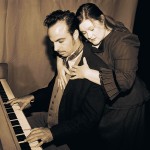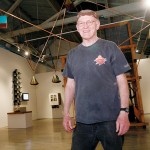After a decade of pushing thousands of people to pursue their dreams, Eric Lochtefeld suddenly had to come face to face with his own this year.
Lochtefeld, who grew up in Menlo Park, had built a career in the music business as an event producer in his 20s. He was best known for co-founding the Vans Warped Tour before he walked away from it all at age 28 to start the University of Dreams, a company that places candidates into internships around the world. Now called Dream Careers Inc., with Lochtefeld as CEO, the company matches up about 3,000 people a year with internships in their desired fields.
But there was one particular thing that drew him relocate to Redwood City: the Fox Theatre. Since his earliest days in the music industry he had dreamt of owning a club as grand and historic as the Fox, built in 1928 at the height of Art Deco. “I moved my company to Redwood City because I wanted to be close to that theater,” says Lochtefeld. “Every day I would drive by the theater and think, ‘Someday.’”
“Someday” came this January, when the Fox and adjoining property was put up for sale. It had been bought by John Anagnostou in 1998, and though he brought with him an ambitious vision for Redwood City built around the Fox, Palo Alto’s Coast Capital Income Fund foreclosed on it last year, saying Anagnostou owed over $1 million dollars on his line of credit. When a public auction had no takers, Coast Capital took over the property again. But suddenly, there was a bidding war going on for the Fox. Lochtefeld realized that since he was already paying a huge amount of money for his company’s 5,500 square feet of office space, it wouldn’t be out of the question to pay more for a 40,000-square-foot package that included 10,000 square feet of office space. Plus, Lochtefeld saw a lot of untapped potential in the Fox.
“Nobody saw that coming at all,” he says of the Fox’s demise. “But it was a real estate failure, not a theater failure.”
So he took what he calls a “wild stab in the dark,” putting in a bid. But he was up against some big players, including AEG.
“We were definitely the little guy,” he says. “I felt like it was slipping away. So I went in there and laid it on the line.”
Lochtefeld’s impassioned speech laying out his vision and specific plans for the Fox, he was later told, was the game-changer. He won the bid—and the real work began. “It was one of the happiest days of my life,” he says.
As the Fox celebrates its grand opening this weekend with a headlining performance from bluesman Robert Cray, Lochtefeld has already secured 100 percent of the office and retail space; easing that financial burden, he says, will give the theater room to grow.
To manage the music end, Lochtefeld immediately turned to his brother, Charlie. Not only did he bring years in the music industry himself—as a booking agent, tour manager across 40 countries and producer of events across the country—but Charlie had actually booked shows into both the Fox and its adjacent smaller sister club, the Little Fox, under the previous owner. Charlie took over ownership of the Little Fox, now called Club Fox, and signed on as entertainment director for the Fox, meaning he will be booking concerts at both of the clubs. Though renovations are still in the works, there’s already been architectural lighting put into the big theater, and an $80,000 digital sound system installed in Club Fox, among other changes.
Charlie doesn’t see Anagnostou’s tenure with the Fox as a failure (“he did a lot of things right, and he had a vision”), but he plans to build the clubs’ programming from the ground up, rather than what might be considered “top-down” big-name shows of the type the Fox would have presented sporadically under the previous ownership.
“The best thing that we can do is make it more a reflection of the community,” he says. To that end, he is working with a growing number of promoters whose shows can be considered “neglected programming”—Latin, Ukrainian and many other types of world music, along with the blues and Americana shows the Little Fox in particular has been known for. Other niches the Fox will develop are comedy, theater (they’ve already signed a 62-date-per-deal with Broadway by the Bay), private events and lecture series. For now, at least, they will move away from what Charlie calls “aging has-beens at top dollar.” Philosophical where his brother is methodical, he sees the whole model of the music industry shifting to more community-based programming—the old one, he says, has gotten so overpriced it’s begun to collapse on itself.
“We’re in a very unusual time in the music business,” he says. “I hear a lot of people saying live music is dead. But I think we’re in a place we’ve never been before. There are so many great artists and communities out there. It’s very exciting.”

 Turn of the Screw
Turn of the Screw  Tony May: Old Technology
Tony May: Old Technology 








